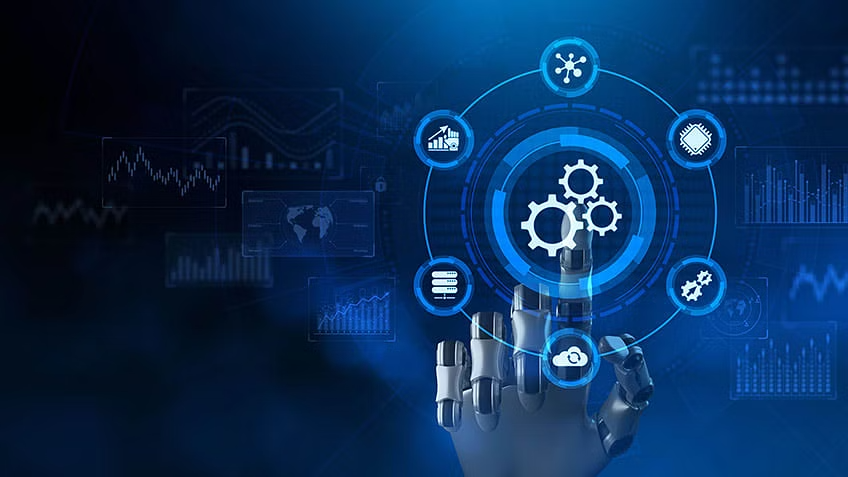In today’s rapidly evolving business landscape, where efficiency and agility are paramount, companies are turning to innovative technologies to streamline their operations. One such technology that has gained significant traction is Robotic Process Automation (RPA), a powerful tool that leverages artificial intelligence (AI) to automate repetitive and rule-based tasks, thus revolutionizing how businesses operate and compete.
Understanding Robotic Process Automation (RPA)
Robotic Process Automation refers to the use of software robots, or bots to mimic human actions and interact with digital systems to execute tasks. These tasks can range from data entry and data extraction to processing transactions and generating reports. RPA systems are trained to perform routine processes that were traditionally performed by humans, eliminating human error and significantly reducing the time required for these activities.
The true power of RPA lies in its ability to work seamlessly across different applications and systems without the need for complex integrations or major changes to existing infrastructure. This makes it an ideal solution for businesses looking to optimize their processes quickly and efficiently.
How Robotic Process Automation Works
RPA software operates based on predefined rules and instructions. It can perform tasks such as logging into applications, copying and pasting data, filling out forms, and even making decisions based on programmed criteria. RPA bots can interact with user interfaces just like a human user, navigating through applications and systems to complete tasks accurately and swiftly.
Key components of an Robotic Process Automation system include:
Bot Development: RPA bots are created using specialized development environments. Developers define the steps and logic required to complete a task, and the software translates these instructions into automated actions.
Process Automation: Bots execute the predefined tasks by interacting with user interfaces, applications, and databases. They can work 24/7, significantly reducing processing times.
Integration: RPA bots can integrate with various systems, databases, and applications, enabling data exchange and efficient workflow management.
Monitoring and Analytics: RPA platforms provide insights into process performance, allowing businesses to track and measure the impact of automation on efficiency, accuracy, and cost savings.
Benefits of Robotic Process Automation
The adoption of RPA offers numerous benefits that contribute to optimizing business processes:
Increased Efficiency: RPA accelerates processes by eliminating manual intervention and reducing processing time, leading to faster outcomes and improved customer service.
Accuracy and Compliance: RPA minimizes the risk of human error, ensuring consistency and compliance with regulations and business rules.
Cost Savings: By automating repetitive tasks, businesses can significantly reduce labor costs and reallocate human resources to more strategic and value-added activities.
Scalability: RPA allows businesses to scale operations up or down without major adjustments, making it easier to handle fluctuations in workload.
Enhanced Analytics: Automation generates valuable data insights, enabling businesses to make informed decisions and identify areas for further optimization.
Employee Satisfaction: Employees are relieved from mundane and repetitive tasks, allowing them to focus on creative and strategic aspects of their roles, which can lead to increased job satisfaction.
Industries and Use Cases
RPA has found application across various industries, transforming operations in areas such as:
Finance and Banking: Automating tasks like account reconciliation, invoice processing, and fraud detection.
Healthcare: Streamlining patient record management, claims processing, and appointment scheduling.
Manufacturing: Optimizing supply chain management, inventory tracking, and order processing.
Human Resources: Automating employee onboarding, payroll processing, and leave management.
Customer Service: Improving response times and resolution rates through automated ticket handling and query routing.
The Future of Robotic Process Automation and AI Automation
As AI and machine learning technologies continue to advance, the capabilities of RPA are expected to grow even further. Future developments may include enhanced cognitive automation, where RPA bots can handle more complex tasks involving decision-making and natural language processing.
However, it’s important to note that while RPA offers significant benefits, it’s not a one-size-fits-all solution. Businesses need to carefully assess their processes, identify suitable tasks for automation, and plan for proper implementation and integration.
Robotic Process Automation is a game-changer in the world of business process optimization. By leveraging AI-powered automation, companies can achieve remarkable efficiency gains, reduce costs, and empower employees to focus on strategic initiatives. As RPA continues to evolve, its role in reshaping industries and driving innovation will only become more pronounced.
Embracing RPA today can position businesses at the forefront of the digital transformation journey, ensuring they remain competitive in the dynamic and fast-paced business landscape of tomorrow.
















Leave a comment